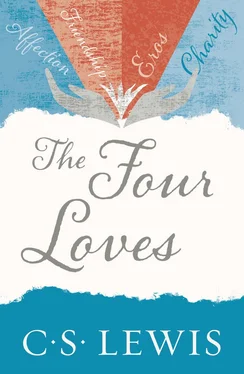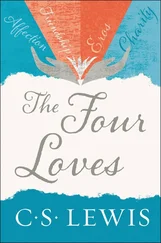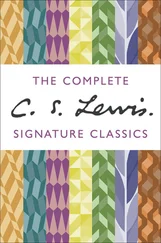C. Lewis - The Four Loves
Здесь есть возможность читать онлайн «C. Lewis - The Four Loves» — ознакомительный отрывок электронной книги совершенно бесплатно, а после прочтения отрывка купить полную версию. В некоторых случаях можно слушать аудио, скачать через торрент в формате fb2 и присутствует краткое содержание. Жанр: unrecognised, на английском языке. Описание произведения, (предисловие) а так же отзывы посетителей доступны на портале библиотеки ЛибКат.
- Название:The Four Loves
- Автор:
- Жанр:
- Год:неизвестен
- ISBN:нет данных
- Рейтинг книги:5 / 5. Голосов: 1
-
Избранное:Добавить в избранное
- Отзывы:
-
Ваша оценка:
- 100
- 1
- 2
- 3
- 4
- 5
The Four Loves: краткое содержание, описание и аннотация
Предлагаем к чтению аннотацию, описание, краткое содержание или предисловие (зависит от того, что написал сам автор книги «The Four Loves»). Если вы не нашли необходимую информацию о книге — напишите в комментариях, мы постараемся отыскать её.
The Four Loves — читать онлайн ознакомительный отрывок
Ниже представлен текст книги, разбитый по страницам. Система сохранения места последней прочитанной страницы, позволяет с удобством читать онлайн бесплатно книгу «The Four Loves», без необходимости каждый раз заново искать на чём Вы остановились. Поставьте закладку, и сможете в любой момент перейти на страницу, на которой закончили чтение.
Интервал:
Закладка:
C. S. LEWIS
THE FOUR
LOVES
‘That our affections kill us not, nor dye,’
DONNE
Copyright Copyright 1 INTRODUCTION 2 LIKINGS AND LOVES FOR THE SUB-HUMAN 3 AFFECTION 4 FRIENDSHIP 5 EROS 6 CHARITY About the Author Also in this Series: About the Publisher
William Collins
An imprint of HarperCollins Publishers 1 London Bridge Street London SE1 9GF www.WilliamCollinsBooks.com
First published in Great Britain by
Geoffrey Bles 1960
Copyright © C. S. Lewis Pte Ltd 1960
Cover design and illustration by Kimberly Glyder
All rights reserved under International and Pan-American Copyright Conventions. By payment of the required fees, you have been granted the non-exclusive, non-transferable right to access and read the text of this e-book on-screen. No part of this text may be reproduced, transmitted, down-loaded, decompiled, reverse engineered, or stored in or introduced into any information storage and retrieval system, in any form or by any means, whether electronic or mechanical, now known or hereinafter invented, without the express written permission of HarperCollins.
Ebook Edition © OCTOBER 2010 ISBN: 9780007332304
Version: 2015-12-19
CONTENTS
Cover
Title Page C. S. LEWIS THE FOUR LOVES ‘That our affections kill us not, nor dye,’ DONNE
Copyright Copyright Copyright 1 INTRODUCTION 2 LIKINGS AND LOVES FOR THE SUB-HUMAN 3 AFFECTION 4 FRIENDSHIP 5 EROS 6 CHARITY About the Author Also in this Series: About the Publisher William Collins An imprint of HarperCollins Publishers 1 London Bridge Street London SE1 9GF www.WilliamCollinsBooks.com First published in Great Britain by Geoffrey Bles 1960 Copyright © C. S. Lewis Pte Ltd 1960 Cover design and illustration by Kimberly Glyder All rights reserved under International and Pan-American Copyright Conventions. By payment of the required fees, you have been granted the non-exclusive, non-transferable right to access and read the text of this e-book on-screen. No part of this text may be reproduced, transmitted, down-loaded, decompiled, reverse engineered, or stored in or introduced into any information storage and retrieval system, in any form or by any means, whether electronic or mechanical, now known or hereinafter invented, without the express written permission of HarperCollins. Ebook Edition © OCTOBER 2010 ISBN: 9780007332304 Version: 2015-12-19
1 INTRODUCTION
2 LIKINGS AND LOVES FOR THE SUB-HUMAN
3 AFFECTION
4 FRIENDSHIP
5 EROS
6 CHARITY
About the Author
Also in this Series:
About the Publisher
1 INTRODUCTION
‘God is love,’ says St John. When I first tried to write this book I thought that his maxim would provide me with a very plain highroad through the whole subject. I thought I should be able to say that human loves deserved to be called loves at all just in so far as they resembled that Love which is God. The first distinction I made was therefore between what I called Gift-love and Need-love. The typical example of Gift-love would be that love which moves a man to work and plan and save for the future well-being of his family which he will die without sharing or seeing; of the second, that which sends a lonely or frightened child to its mother’s arms.
There was no doubt which was more like Love Himself. Divine Love is Gift-love. The Father gives all He is and has to the Son. The Son gives Himself back to the Father, and gives Himself to the world, and for the world to the Father, and thus gives the world (in Himself) back to the Father too.
And what, on the other hand, can be less like anything we believe of God’s life than Need-love? He lacks nothing, but our Need-love, as Plato saw, is ‘the son of Poverty’. It is the accurate reflection in consciousness of our actual nature. We are born helpless. As soon as we are fully conscious we discover loneliness. We need others physically, emotionally, intellectually; we need them if we are to know anything, even ourselves.
I was looking forward to writing some fairly easy panegyrics on the first sort of love and disparagements of the second. And much of what I was going to say still seems to me to be true. I still think that if all we mean by our love is a craving to be loved, we are in a very deplorable state. But I would not now say (with my master, MacDonald) that if we mean only this craving we are mistaking for love something that is not love at all. I cannot now deny the name love to Need-love. Every time I have tried to think the thing out along those lines I have ended in puzzles and contradictions. The reality is more complicated than I supposed.
First of all, we do violence to most languages, including our own, if we do not call Need-love ‘love’. Of course language is not an infallible guide, but it contains, with all its defects, a good deal of stored insight and experience. If you begin by flouting it, it has a way of avenging itself later on. We had better not follow Humpty Dumpty in making words mean whatever we please.
Secondly, we must be cautious about calling Need-love ‘mere selfishness’. Mere is always a dangerous word. No doubt Need-love, like all our impulses, can be selfishly indulged. A tyrannous and gluttonous demand for affection can be a horrible thing. But in ordinary life no one calls a child selfish because it turns for comfort to its mother; nor an adult who turns to his fellow ‘for company’. Those, whether children or adults, who do so least are not usually the most selfless. Where Need-love is felt there may be reasons for denying or totally mortifying it; but not to feel it is in general the mark of the cold egoist. Since we do in reality need one another (‘it is not good for man to be alone’), then the failure of this need to appear as Need-love in consciousness – in other words, the illusory feeling that it is good for us to be alone – is a bad spiritual symptom; just as lack of appetite is a bad medical symptom because men do really need food.
But thirdly, we come to something far more important. Every Christian would agree that a man’s spiritual health is exactly proportional to his love for God. But man’s love for God, from the very nature of the case, must always be very largely, and must often be entirely, a Need-love. This is obvious when we implore forgiveness for our sins or support in our tribulations. But in the long run it is perhaps even more apparent in our growing – for it ought to be growing – awareness that our whole being by its very nature is one vast need; incomplete, preparatory, empty yet cluttered, crying out for Him who can untie things that are now knotted together and tie up things that are still dangling loose. I do not say that man can never bring to God anything at all but sheer Need-love. Exalted souls may tell us of a reach beyond that. But they would also, I think, be the first to tell us that those heights would cease to be true Graces, would become Neo-Platonic or finally diabolical illusions, the moment a man dared to think that he could live on them and henceforth drop out the element of need. ‘The highest,’ says the Imitation , ‘does not stand without the lowest.’ It would be a bold and silly creature that came before its Creator with the boast ‘I’m no beggar. I love you disinterestedly.’ Those who come nearest to a Gift-love for God will next moment, even at the very same moment, be beating their breasts with the publican and laying their indigence before the only real Giver. And God will have it so. He addresses our Need-love: ‘Come unto me all ye that travail and are heavy-laden,’ or, in the Old Testament, ‘Open your mouth wide and I will fill it.’
Читать дальшеИнтервал:
Закладка:
Похожие книги на «The Four Loves»
Представляем Вашему вниманию похожие книги на «The Four Loves» списком для выбора. Мы отобрали схожую по названию и смыслу литературу в надежде предоставить читателям больше вариантов отыскать новые, интересные, ещё непрочитанные произведения.
Обсуждение, отзывы о книге «The Four Loves» и просто собственные мнения читателей. Оставьте ваши комментарии, напишите, что Вы думаете о произведении, его смысле или главных героях. Укажите что конкретно понравилось, а что нет, и почему Вы так считаете.












